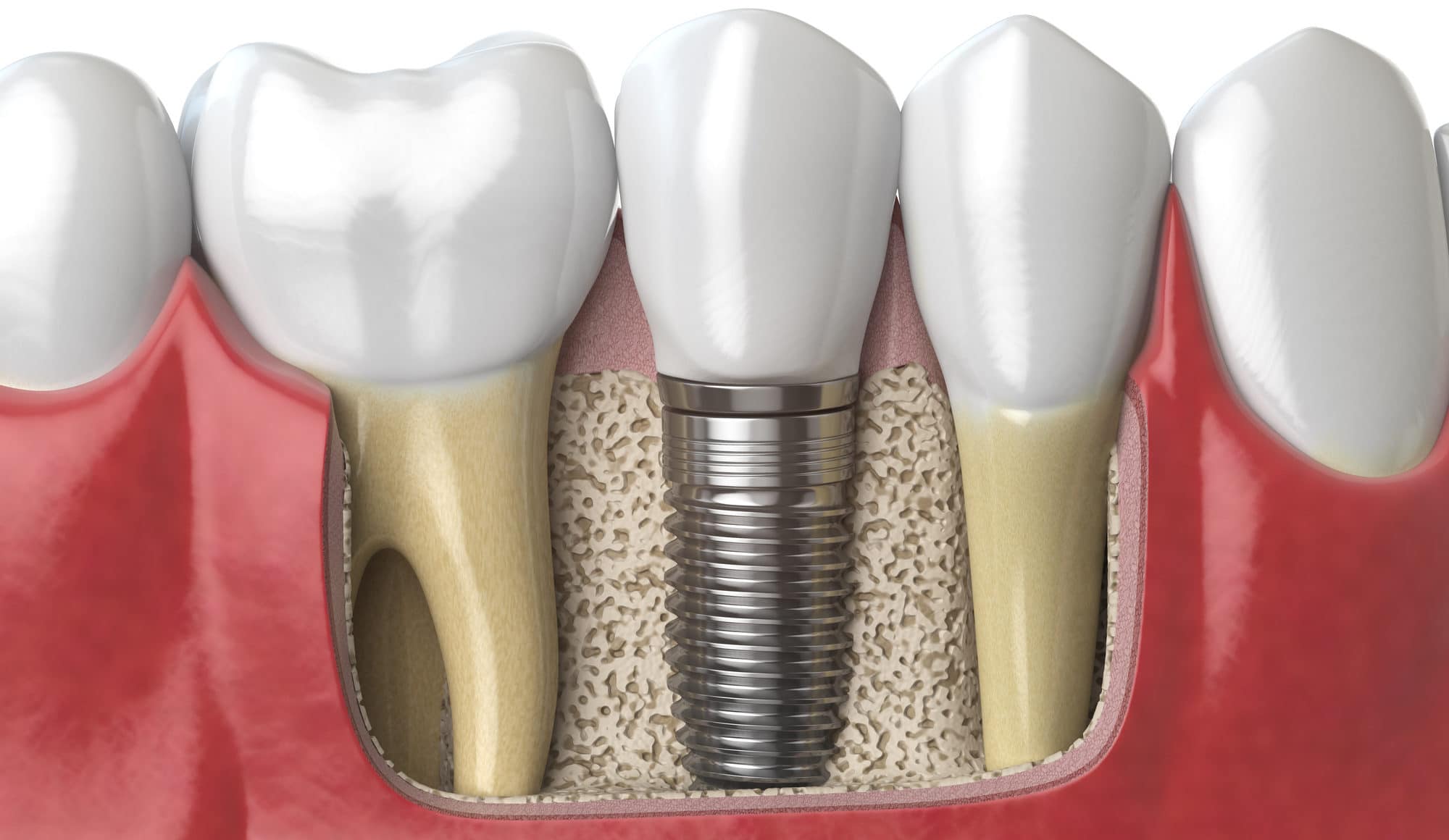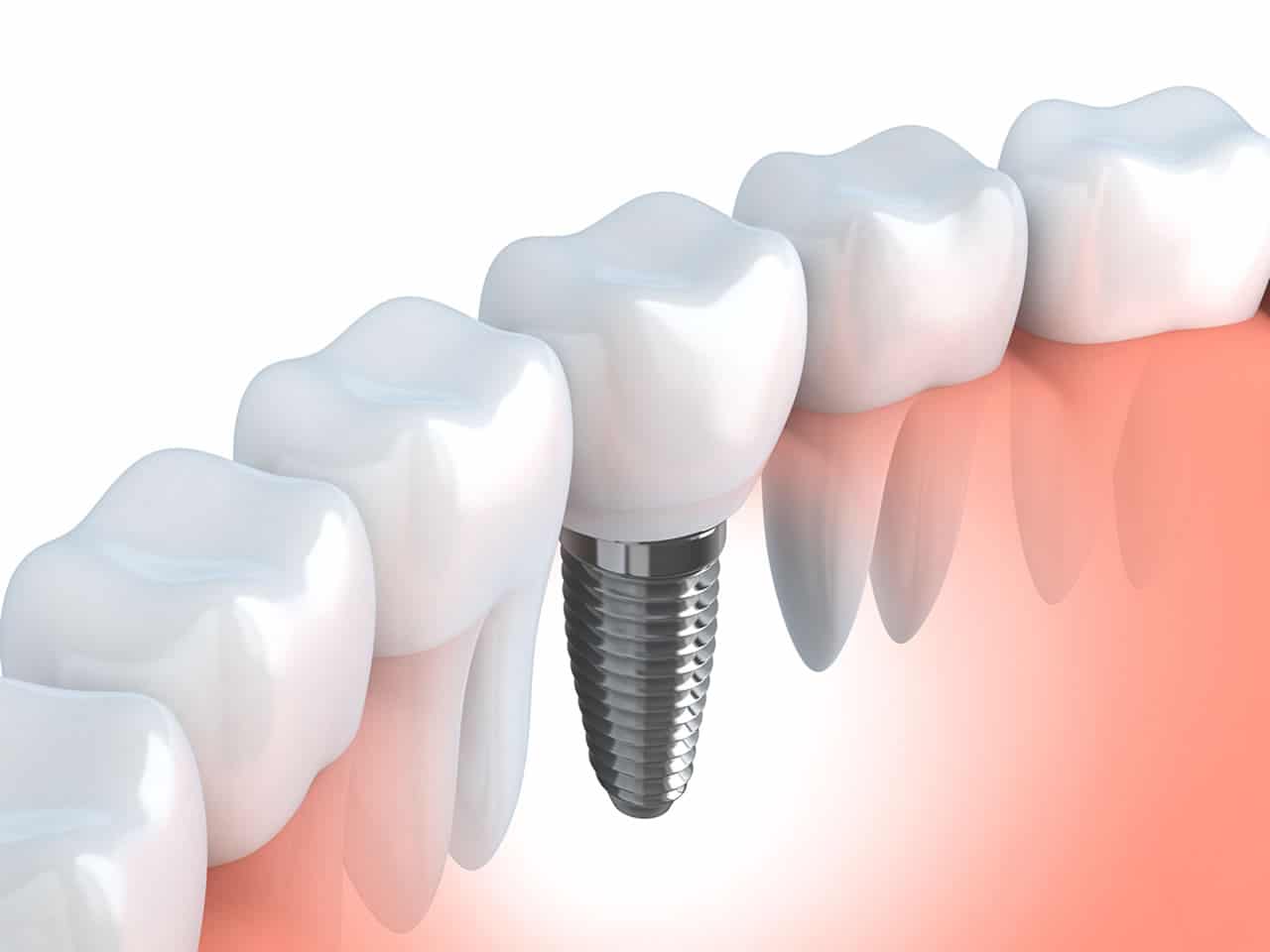Dental Implants In Brunswick & Maine
What Are Dental Implants?
Dental implants are anchors that are implanted into a jawbone that help hold replacement teeth in place. The root of an implant sits beneath the gum line and the tooth (crown) is attached to the root. Implants function and feel very similar to natural teeth. They can be used to replace individual teeth as well as for bridges and dentures.
Looking for an experienced Implant Surgeon you can trust? Look no further.
Dr. Oshetski is a credentialed expert in both the surgical placement and restoration of dental implants. He has placed and restored thousands of dental implants. With his experience and use of advanced diagnostics and sedation, he is able to deliver comprehensive treatment comfortably in his office. Dr. Oshetski’s hygienists and assistants have specialized training in the delivery of implant rehabilitation and they are focused on treating each patient with compassion and individualized attention.
- Dental implants let you eat the foods you love.
- Dental Implants are the only proven way to prevent bone loss after the loss of natural teeth.
- Research shows that implant-supported prostheses increase patient comfort.
- 70% of the U.S. population is missing at least one tooth.
Losing one or more of your teeth creates a gap in your smile, affects your ability to chew properly, and can alter your diet and nutrition. While these are all serious issues, many people do not know that tooth loss also leads to bone loss.
 Normal Profile
Normal Profile After Tooth Loss
After Tooth Loss After Bone Loss
After Bone LossWhen a tooth is lost, the jawbone beneath it begins to shrink (atrophy) and becomes brittle from lack of exercise. Not only does losing a tooth affect your smile, but it also changes the shape of your face causing you to look prematurely aged.
What Are The Benefits of Dental Implants?
The benefits of dental implants include:
-
- replacing missing teeth
- maintaining bone structure
- maintaining your youthful appearance
- restoring your natural smile
Dental Implant Candidates
During your consultation, Dr. Oshetski will evaluate and discuss your dental health with you so that you have a complete understanding of the options available to you.
Dental Implant Consultation
Dental Implants are a great treatment option for our patients. We believe that it is our responsibility to provide information and answer questions to help prepare you for your dental implant procedure.
Dr. Oshetski and his skilled and caring Dental Implant Treatment Coordinator, Vanessa Cormier, will clearly explain every step of the procedure and make it simple for you to understand. Diagnostic and supplemental information will be collected to create a treatment plan for your consideration.
During the consultation, Dr. Oshetski will dedicate this time to analyzing your teeth and gums, utilizing diagnostic technology to address your questions or concerns. This appointment will give you a chance to acclimate yourself to our implant focused dental facility and discover the numerous amenities available to you.
Dental Implants Process
The dental implants process involves a few steps:
First – Implants are placed into the jawbone to take the place of the root of the missing tooth.
Second – Once your mouth has healed and the implant has fused with the bone, Dr. Oshetski will take impressions of your teeth & bite to help fabricate an abutment (connector post) and crown.
Third – The abutment and crown are then attached to this implant, completing the dental implant process.
After Placement of Dental Implants
Do not disturb the wound. Avoid rinsing, spitting, or touching the wound on the day of surgery. There will be a metal healing abutment protruding through the gingival (gum) tissue.
Bleeding
Some bleeding or redness in the saliva is normal for 24 hours. Excessive bleeding (your mouth fills up rapidly with blood) can be controlled by biting on a gauze pad placed directly on the bleeding wound for 30 minutes. If bleeding continues please call for further instructions.
Swelling
Swelling is a normal occurrence after surgery. To minimize swelling, apply an ice bag, or a plastic bag, or towel filled with ice on the cheek in the area of surgery. Apply the ice continuously, as much as possible, for the first 36 hours.
Diet
Drink plenty of fluids. Avoid hot liquids or food. Soft food and liquids should be eaten on the day of surgery. Return to a normal diet as soon as possible unless otherwise directed.
Pain
You should begin taking pain medication as soon as you feel the local anesthetic wearing off. For moderate pain, 1 or 2 Tylenol or Extra Strength Tylenol may be taken every 3-4 hours. Ibuprofen (Advil or Motrin) may be taken instead of Tylenol. Ibuprofen, bought over the counter comes in 200 mg tablets: 2-3 tablets may be taken every 3-4 hours as needed for pain. For severe pain, the prescribed medication should be taken as directed. Do not take any of the above medication if you are allergic, or have been instructed by your doctor not to take it.
Antibiotics
Be sure to take the prescribed antibiotics as directed to help prevent infection.
Oral Hygiene
Good oral hygiene is essential to good healing. The night of surgery, use the prescribed Peridex Oral Rinse before bed. The day after surgery, the Peridex should be used twice daily, after breakfast and before bed. Be sure to rinse for at least 30 seconds then spit it out. Warm salt water rinses (one teaspoon of salt in a cup of warm water) should be used at least 4-5 times a day, as well, especially after meals. Brushing your teeth and the healing abutments are no problem. Be gentle initially with brushing the surgical areas.
Activity
Keep physical activities to a minimum immediately following surgery. If you are considering exercise, throbbing or bleeding may occur. If this occurs, you should discontinue exercising. Keep in mind that you are probably not taking normal nourishment. This may weaken you and further limit your ability to exercise.
Wearing your Prosthesis
Partial dentures, flippers, or full dentures should not be used immediately after surgery and for at least 10 days. This was discussed in the pre-operative consultation.
Why Should I Choose Implants Over Dentures?

Many denture patients are forced to eat high calorie processed foods versus whole foods leading to overall health concerns and decreased quality of life. Dentures cause the muscles of chewing to weaken and only function at 20%, compared to patients with natural teeth or implants. Without the stimulation of teeth or implants, the jaw bones will continually resorb leading to debilitating conditions or even jaw fracture.
How Painful Is Getting A Dental Implant?
No, it is usually performed with local anesthesia (numbing) with the option of IV sedation for those who wish to remember nothing of the visit. Since the procedure is regenerative and focused on healing, careful attention is taken to reduce potential causes of pain. You will not even know the implant or implants has been placed as many patients comment.
How Much Pain Will I Feel After Implant Placement?
There is seldom discomfort and if so, can be easily managed with over-the-counter medications that you would normally take for a headache.
How Long Does A Dental Implant Procedure Take?
Depending on the location and the number of implants, they may be placed in as little as 15-30 minutes.
What Can I Eat After Having An Implant Placed?
Depending on your treatment and number of implants, you will be given a customized diet outline for the first few days and afterward. Most treatments only require minor diet modification.
How Long Does Placement, Healing, And Construction Of The Replacement Teeth Take?
The entire process usually takes from 2 to 6 months, depending on your treatment needs. This gives the bone time to heal and attach to the implant(s). In some situations, implant and tooth replacement may be provided the same day which is called an “immediate implant” and is Dr. Oshetski’s preferred placement method when appropriate.
What Are Immediate Implants?
Some implants can be placed and restored in one day at the same time a failing tooth is removed. Dr. Oshetski will determine if you are a candidate for an immediate implant. Our “TeethXpress” treatment is revolutionary and places implants and teeth the same day.
How Do I Care For My Implants?
Home care for your implants is customized and our hygienist will help you achieve the best method for caring for your implant. Regular dental visits are recommended for long-term health and success of your replacement tooth.
How Long Can Implants Last?
Implants can last decades if cared for properly. Many implants have been in place for more than 50 years.
What Happens If An Implant Fails To Osseointegrate Or “Take”?
No worries, the implant is removed and another implant can often be placed in the same position to replace your tooth.
Are Dental Implants Covered By Insurance?
Depending on your insurance, most implants may be covered by your dental insurance plans. Our staff with help you finance your treatment and insurance benefits.
Patient Reviews
“A thorough cleaning and check for any problems. I am delighted to have found this highly trained and friendly practice. I recommend Dr Oshetski’s practice without reservation” – P.M. 11/10/2018
Contact Us Today
Are you ready to restore your smile? Call our Brunswick Office at or submit an online contact form to schedule your dental implant consultation with Dr. Oshetski today!
The patient information regarding dental implants is generated from educational materials provided by the International Congress of Oral Implantologists (ICOI). All images related to implant education are copyrighted and reprinted by permission from BioHorizons (www.biohorizons.com).
Looking for an experienced Implant Surgeon you can trust? Look no further.
Dr. Oshetsk is a credentialed expert in both the surgical placement and restoration of dental implants. He has placed and restored thousands of dental implants. With his experience and use of advanced diagnostics and sedation, he is able to deliver comprehensive treatment comfortably in his office. Dr. Oshetski’s hygienists and assistants have specialized training in the delivery of implant rehabilitation and they are focused on treating each patient with compassion and individualized attention.
Select a topic below to learn more:



